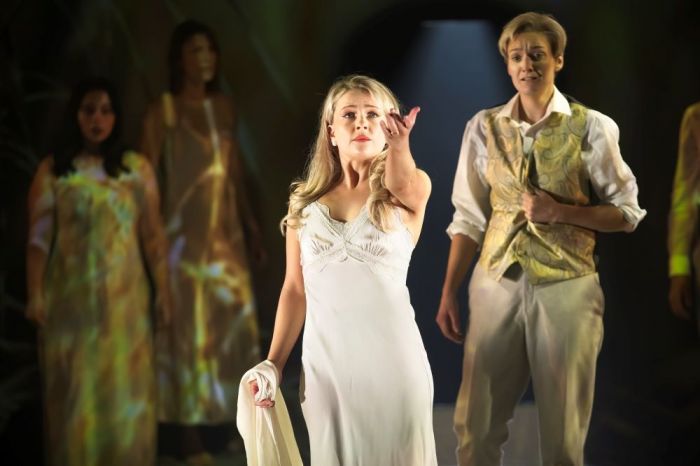
These short operas by Gluck and Purcell respectively, are remarkably complementary, yet, perhaps surprisingly, rarely performed together, which makes this double bill at The Grange Festival even more of a delight. Both works retell classical myths and explore universal themes and emotions – love, the importance of artistic expression, and the malignant forces that culminate in death – with an unparalleled mixture of dramatic candor and adored arias.
Daniel Slater’s production of Orfeo ed Euridice is dynamic and full of zest. Robert Innes Hopkins’ set is a blank concave back wall – a giant video screen onto which a climbing wall has been subtly superimposed and an inexhaustibly wide-ranging array of videos, courtesy of Nina Dunn, are projected. There are various openings through which the performers emerge and recede. In the opening wedding scene, during Gluck’s uplifting overture (played by the Orchestra of the Sixteen, conducted by Harry Christophers), as Dunn’s video designs of bucolic bliss are projected onto the screen as the chorus – The Sixteen (trained by Tom Primrose), supplemented by members of the Grange Festival Chorus – rush in, joyfully, attired in floral dresses and pale linen suits, to celebrate the wedding of the hapless Orfeo (mezzo Heather Lowe) and Euridice (Alexandra Oomens), until Euridice’s sudden demise destroys the atmosphere of nuptial bliss. It’s a kinetic opening, and the pace is matched throughout; Tim Claydon’s choreography is energetic throughout both operas, and The Sixteen express the energy of Gluck’s score both physically and vocally.
As Euridice is ritually wrapped in a white shroud and conveyed to the Underworld, the poignancy of Orfeo’s position of the bereaved husband is perfectly expressed by Lowe, whose interpretation of the bereaved husband who goes to hell and back – literally - to restore his wife to the land of the living, is flawless throughout.
The mourning scene is juxtaposed with the sudden interjection of Amore (played with pizzazz by Caroline Blair) – who swings sassily onto the stage in a blaze of bubble-gum pink lighting and offers Orfeo an opportunity to rescue his bride. Blair is accompanied by five sidekicks who sashay their way onto the stage (dancers Hayley Chilvers, Electra, Fiona Macbride, Blair Moore and Holly Saw).
Orpheus journeys through the writhing, suffering spirits in the ruins of Hades, whose bodies eerily ooze out of the orifices in the set, colliding in a squirming mass. When he finally wins their pity, the Elysian fields appear – the pastoral paradise represented visually by fluttering wheat chaffs. After he reclaims Euridice, Orfeo must contend with a maze spun with cunning complexity by the lithe dancers. After scaling the climbing wall, Orfeo loses his way, and looks back at his bride, causing Euridice, perched halfway up the wall, to glide gracefully to her death a second time. Amore returns to resuscitate Euridice again, and the opening scene is re-enacted; was this all just a dream after all? Apparently not. Amid the revelling and rejoicing, Euridice dies again, and though she does return at the end, Orfeo stands alone, despondent. Ambiguous though the ending may be, the musical merits of the production are clear. Lowe’s portrayal of Orfeo is heartfelt and impassioned, and her mellifluous mezzo voice was suitably authoritative when it needed to be. Oomens’ is an enchanting Euridice: defiantly girlish, her clear, bright voice and demeanor perfectly conveying Euridice’s kaleidoscope of emotions – from joy and tenderness to fear and anger.
Lowe and Oomens display their versatility by pairing up again in Dido and Aeneas, with Lowe playing the ill-fated eponymous queen and Oomens the role of Belinda, supported by Blair as Second Woman. Slater’s Dido is a social media celebrity with a huge following. During the overture a montage of tabloid headlines and paparazzi shots of Dido are projected up onto the stage, including news of her boyfriend – a playboy prince representation of Aeneas and his travails.
Lowe’s background as a trained ballet and ballroom dancer is evident in the way she comports herself – from the first scene when she flounces into her swanky apartment and drapes herself melodramatically over her gigantic cerise sofa, her body moves with an effortless, languid grace, which is matched by her smooth and honeyed tones. Her despair when she is deserted by James Newby’s Aeneas, is palpable, and genuinely moving. Newby’s baritone, as he first woos and then deserts Dido, is superb. A leather-clad Helen Charlston plays a suitably menacing and imperious dominatrix-style Sorceress, whilst Kirsty Hopkins and Katy Hill are a delightfully devious duo as First and Second Witch.
Staging these two operas side-by-side highlights the contrasts inherent in the two works: in Orpheus, the jubilant celebrations give way to the bleak world of the damned, whilst in Dido, the shiny trappings of celebrity are merely a veneer, concealing a world of unhappiness and torment. There is a pleasing symmetry to this fabulous double bill too: at the end of Dido the audience is left with the image of Belinda mourning the death of Dido, visually echoing that of Orfeo grieving Euridice in Gluck’s opera. This is a sensationally good production, with exceptional staging, choreography, and unswervingly high musical standards across the board.
To book, please visit The Grange Festival.
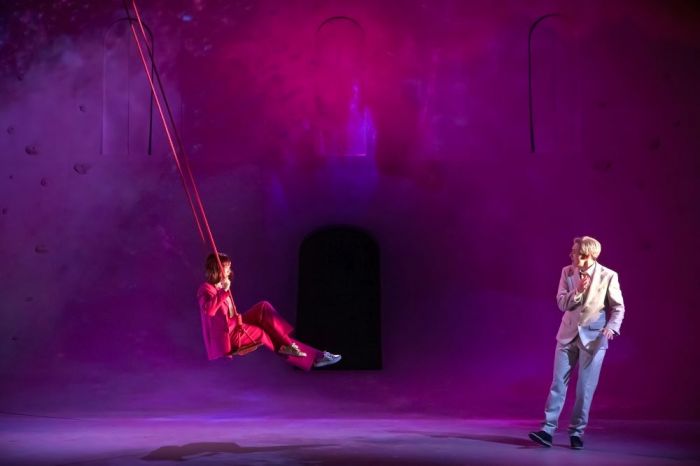
Caroline Blair (Amore) swings onto the stage to help the hapless Heather Lowe (Orfeo).
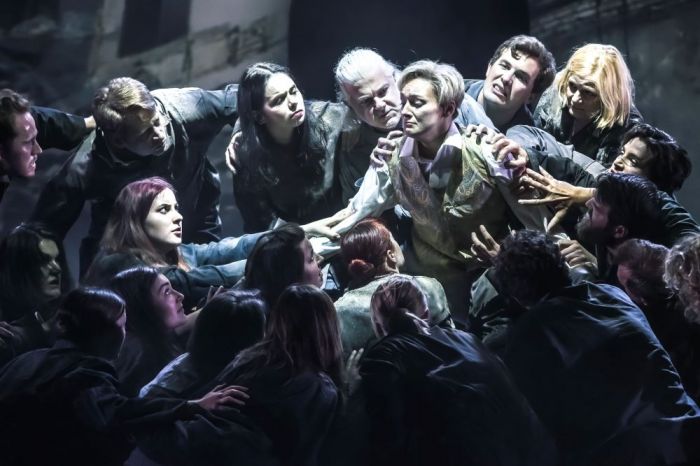
Heather Lowe (Orfeo) in Hades.
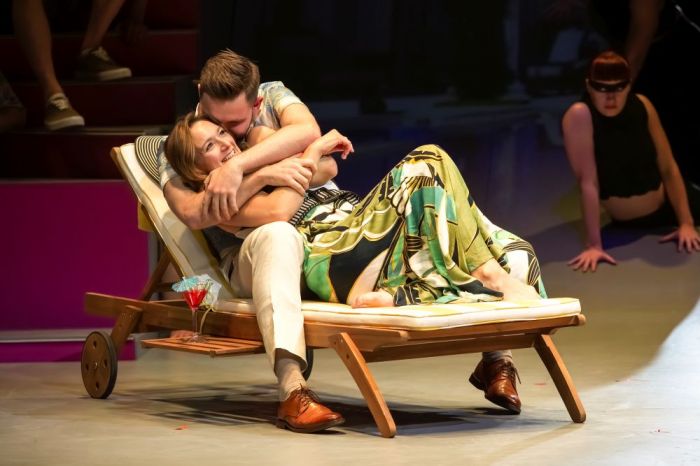
Heather Lowe (Dido) and James Newby (Aeneas).
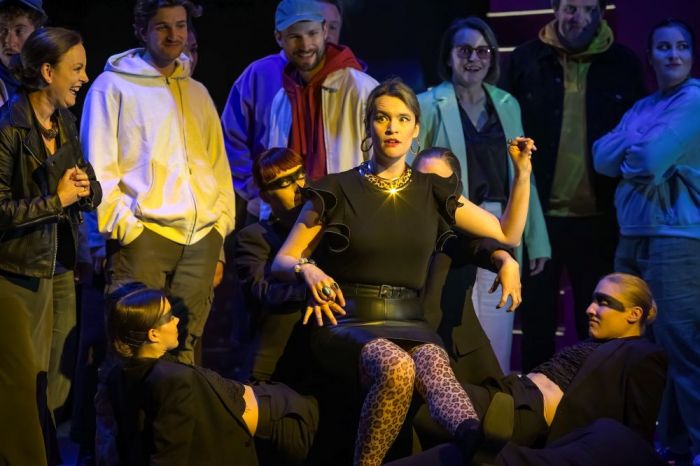
Helen Charlston (Sorceress) flanked by Kirsty Hopkins (First Witch) and Katy Hill (Second Witch) and her flunkies.
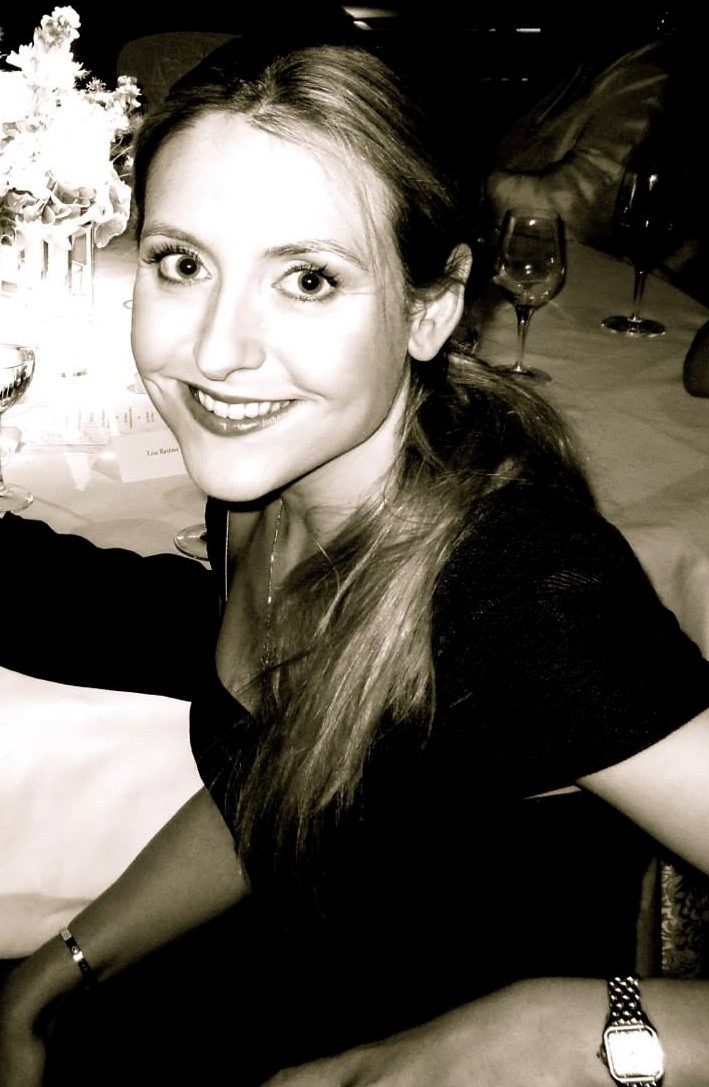
Elisabeth Rushton
Elisabeth has over 15 years of experience as a luxury lifestyle and travel writer, and has visited over 70 countries. She has a particular interest in Japan and the Middle East, having travelled extensively around Saudi Arabia, Oman, Jordan, and the UAE. A keen skier, she has visited over fifty ski resorts around the world, from La Grave to Niseko. She writes about a broad spectrum of subjects...(Read More)










